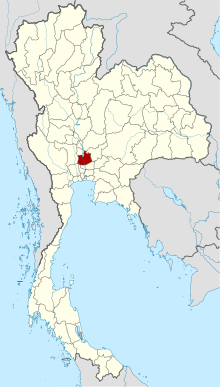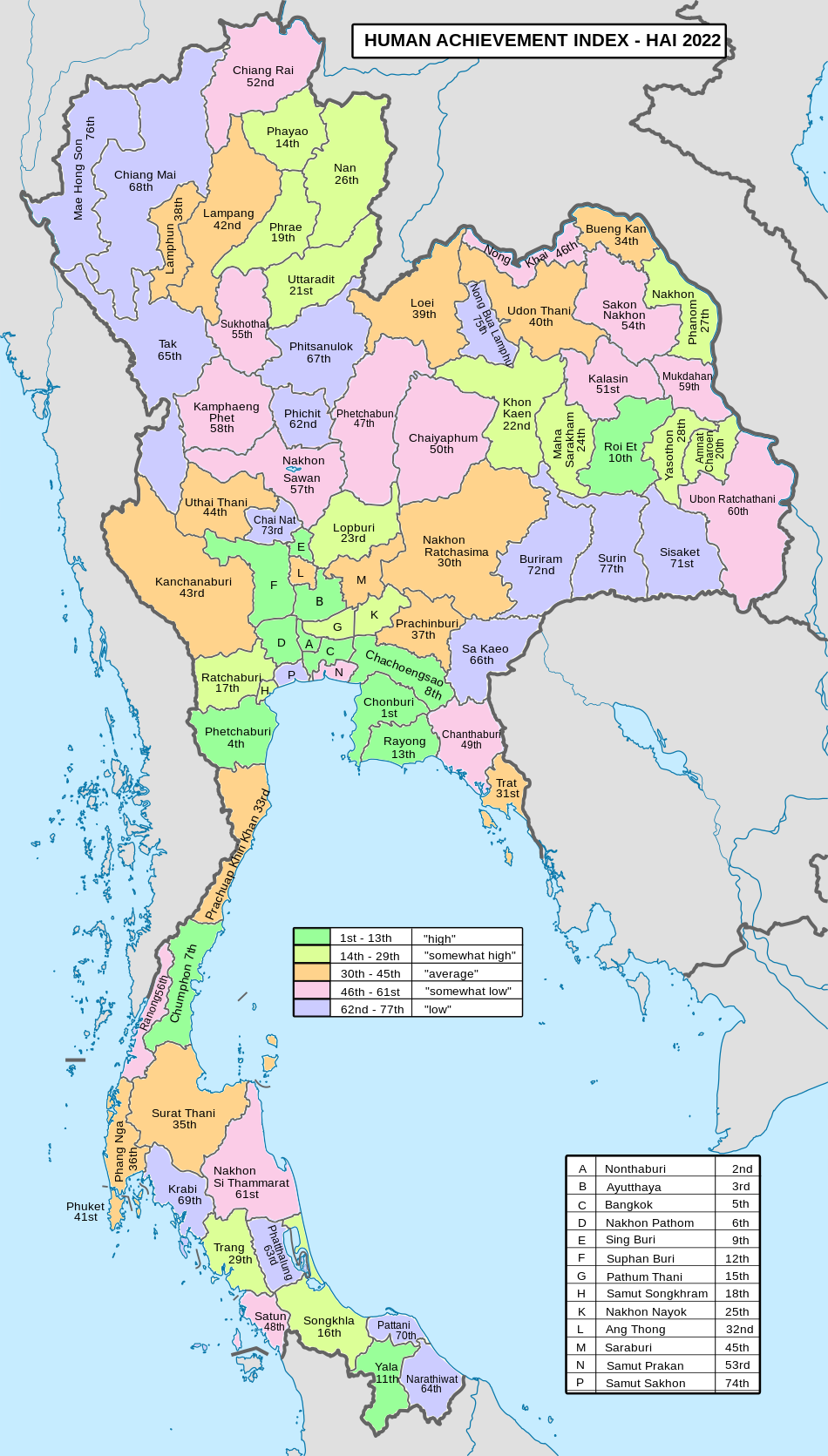Phra Nakhon Si Ayutthaya province
Phra Nakhon Si Ayutthaya
พระนครศรีอยุธยา | |
|---|---|
From left to right, top to bottom: Wat Chaiwatthanaram at night; Ladchado market in Phak Hai district; Wat Phutthaisawan; Luang Pu Thuat statue at Maharat Buddhist Park, Maha Rat district; Prasat Nakhon Luang, Nakhon Luang district; Old steam locomotive at Ban Phachi Junction | |
| Nickname(s): Krung Kao (Thai: กรุงเก่า) (The old capital) Ayutthaya | |
| Motto(s): ราชธานีเก่า อู่ข้าวอู่น้ำ เลิศล้ำกานท์กวี คนดีศรีอยุธยา เลอคุณค่ามรดกโลก ("The old capital. A land flowing with milk and honey. Excellent literature. The good people of Ayutthaya. The treasured world heritage.") | |
 Map of Thailand highlighting Phra Nakhon Si Ayutthaya province | |
| Country | Thailand |
| Capital | Ayutthaya |
| Government | |
| • Governor | Niwat Rungsakorn (since October 2022) |
| Area | |
• Total | 2,557 km2 (987 sq mi) |
| • Rank | Ranked 63rd |
| Population (2018)[2] | |
• Total | 817,441 |
| • Rank | Ranked 30th |
| • Density | 320.0/km2 (829/sq mi) |
| • Rank | Ranked 11th |
| Human Achievement Index | |
| • HAI (2022) | 0.6770 "high" Ranked 3rd |
| GDP | |
| • Total | baht 404 billion (US$13.3 billion) (2019) |
| Time zone | UTC+7 (ICT) |
| Postal code | 13xxx |
| Calling code | 035 |
| ISO 3166 code | TH-14 |
Phra Nakhon Si Ayutthaya,[a] or locally and simply Ayutthaya (historically Juthia or Judia), is one of the central provinces (changwat) of Thailand. Neighboring provinces are (from north clockwise) Ang Thong, Lopburi, Saraburi, Pathum Thani, Nonthaburi, Nakhon Pathom and Suphan Buri.
Toponymy
[edit]The name Ayutthaya derives from the Sanskrit word Ayodhyā, found in the Ramayana, which means "the invincible [city]". Grammatically, this word is composed of the morphemes a- 'not' + yodhya 'defeatable' (from the root yudh- 'to fight') + ā, a feminine suffix.
Geography
[edit]Phra Nakhon Si Ayutthaya, covering 2,557 square kilometres (987 sq mi),[1] is on the flat river plain of the Chao Phraya River valley. The presence of the Lopburi and Pa Sak rivers makes the province a major rice farming area. The total forest area is 0.05 km2 (0.019 sq mi) or 0.02 per mille of provincial area.[5]
Economy
[edit]Honda has an automobile factory in the province. Honda produces hybrid electric vehicles (HEVs) and batteries for electric vehicles there, and at its factory in Prachin Buri. Honda's Ayutthaya factory has an annual capacity of 300,000 units.[6]
Health
[edit]Ayutthaya's main hospital is Phra Nakhon Si Ayutthaya Hospital, operated by the Ministry of Public Health.
History
[edit]
Ayutthaya was founded in 1350[a] by King U-Thong. However, the establishment of Ayutthaya is far older than 14th century. Evidence shown that the area was already populated during Mon Dvaravati period. Sources further mentioned that around 850 AD, the Khmers occupied the area and established a stronghold there, named it as Ayodhya after one of the holiest Hindu cities of India of the same name. Early history of Ayutthaya is historically connected to this Khmer settlement.[7][8] Consistently, Prince Damrong also agreed that there was a city called Ayodhya which was found by the Khmers ruling from Lopburi at the point where the three rivers meet.[9] Excavation map shows the traces from an ancient baray (water reservoir) close to the southwestern tip of Wat Yai Chai Mongkhon which could has been built on a former important Khmer temple complex.[10]
Ayutthaya was the capital of Thailand (then called Siam) for 417 years from 1350, until in Burmese–Siamese War (1765–1767), it was sacked by the Burmese army in 1767. During this era, now usually referred as the Ayutthaya period or Ayutthaya kingdom, Ayutthaya was ruled by 33 kings of five different dynasties. The kingdom became a major regional player, and a trade center of the East, a meeting point of European merchants and Asian traders. Notable monarchs during the Ayutthaya period include King Naresuan the Great, who liberated Ayutthaya from the first Burmese occupation and embarked on a reign of conquest, and King Narai the Great, who initiated diplomatic relations with France, during the reign of Louis XIV. His reign was the golden age of trade and culture.
The city was strategically positioned. During several months of the year, the flood plains around the cities would be flooded by the many rivers around the city. Enemy sieges were thus impossible, and forced to withdraw. This advantage was a contributing factor in the many failed Burmese invasions.
The ruins of the old capital in the Ayutthaya historical park have been a UNESCO World Heritage Site since December 1991. The province is also home to the Bang Pa-in summer palace complex.
Originally named Krung Kao (กรุงเก่า), the province was renamed Phra Nakhon Si Ayutthaya in 1926.[11]
Symbols
[edit]
According to legend, King Ramathibodi I found a beautiful conch shell buried in the ground, and chose the site as the place for his capital. He then placed the shell on a pedestal tray and built a pavilion around it. The seal shows this pavilion with the provincial tree behind it.
The provincial flower is the ดอกโสน (RTGS: dok sano) Sesbania aculeata, and the provincial tree is the fragrant manjack (Cordia dichotoma). The giant river prawn (Macrobrachium rosenbergii) is the provincial aquatic life. The provincial slogan ราชธานีเก่า อู่ข้าวอู่น้ำ เลิศล้ำกานท์กวี คนดีศรีอยุธยา เลอคุณค่ามรดกโลก can be translated as "The old capital, a land flowing with milk and honey, excellent literature, the good people of Ayutthaya, the treasured world heritage".
Administrative divisions
[edit]
Provincial government
[edit]The province is divided into sixteen districts (amphoe), 209 subdistricts (tambon) and 1,328 villages (muban). Ayutthaya is unique among the provinces of Thailand in that the district of its seat of government is not called Mueang District Ayutthaya, as the common scheme would suggest, but rather Phra Nakhon Si Ayutthaya District:
Local government
[edit]As of 26 November 2019 there are:[12] one Phra Nakhon Si Ayutthaya Provincial Administration Organisation (ongkan borihan suan changwat) and 36 municipal (thesaban) areas in the province. Ayutthaya municipality has city (thesaban nakhon) status.[13] Ayothaya,[14] Bang Ban, Phak Hai and Sena municipalities have town (thesaban mueang) status. Further 31 subdistrict municipalities (thesaban tambon). The non-municipal areas are administered by 121 Subdistrict Administrative Organisations - SAO (ongkan borihan suan tambon).[2]
Education
[edit]Primary and secondary education
[edit]There are over 400 schools in the province. Notable ones are Ayutthaya Wittayalai School, which is the main provincial school of Ayutthaya, it was founded in 1905 as "Krung-Kao Provincial Model School".[15][16] Chomsurang Upatham School, an all-girls provincial school founded in 1917 by Queen Saovabha Phongsri.[17] The Laboratory School of Phranakhon Si Ayutthaya Rajabhat University, commonly called Satit Ayutthaya, a laboratory school under Phranakhon Si Ayutthaya Rajabhat University.[18]
Higher education
[edit]There are several higher institutions in Ayutthaya.[19] Phranakhon Si Ayutthaya Rajabhat University is a public university located in the Ayutthaya Island. It was founded in 1905 by King Chulalongkorn as "Krung-Kao Teacher Training College".[20] Mahachulalongkornrajavidyalaya University is the oldest Buddhist university in Thailand. It was founded in 1887 by King Chulalongkorn with the purpose of offering higher education to monks.[21] Rajamangala University of Technology Suvarnabhumi, it has four campuses in Hantra, Wasukri, Suphanburi, and Nonthaburi.[22]
Religion
[edit]Religion in Phra Nakhon Si Ayutthaya
Climate
[edit]Ayutthaya, on the central plains, historically has three seasons:
- Hot season: March – May
- Rainy season: June – October
- Cool season: November - February
| Climate data for Ayutthaya | |||||||||||||
|---|---|---|---|---|---|---|---|---|---|---|---|---|---|
| Month | Jan | Feb | Mar | Apr | May | Jun | Jul | Aug | Sep | Oct | Nov | Dec | Year |
| Mean daily maximum °C (°F) | 31.0 (87.8) |
33.3 (91.9) |
35.4 (95.7) |
35.9 (96.6) |
34.3 (93.7) |
32.6 (90.7) |
32.0 (89.6) |
31.4 (88.5) |
31.3 (88.3) |
31.3 (88.3) |
30.7 (87.3) |
30.0 (86.0) |
32.4 (90.3) |
| Mean daily minimum °C (°F) | 17.0 (62.6) |
19.4 (66.9) |
22.3 (72.1) |
24.3 (75.7) |
24.5 (76.1) |
24.3 (75.7) |
24.0 (75.2) |
23.8 (74.8) |
23.5 (74.3) |
22.5 (72.5) |
20.0 (68.0) |
17.4 (63.3) |
21.9 (71.4) |
| Average rainfall mm (inches) | 2.4 (0.09) |
18.8 (0.74) |
43.5 (1.71) |
67.9 (2.67) |
208.0 (8.19) |
223.0 (8.78) |
180.8 (7.12) |
260.0 (10.24) |
213.9 (8.42) |
167.6 (6.60) |
37.1 (1.46) |
0.8 (0.03) |
1,423.8 (56.05) |
| Average rainy days | 0 | 1 | 4 | 6 | 15 | 16 | 17 | 19 | 17 | 12 | 3 | 1 | 111 |
| Source: Thai Meteorological Department[23] | |||||||||||||
Transport
[edit]
- Rail: Ayutthaya's main station is Ayutthaya Railway Station. Ban Phachi Junction in Phachi District regarded as an important junction of the Northern and Northeastern Railway Lines. Bang Pa-in Railway Station in the southern part of the province near the Bang Pa-In Royal Palace has a royal pavilion associated with King Rama V.
- Boat: Ayutthaya has many piers that can be boarded by river cruise from Bangkok pier.
Human achievement index 2022
[edit]| Health | Education | Employment | Income |
| 12 | 40 | 3 | 14 |
| Housing | Family | Transport | Participation |

|
 |

|
|
| 65 | 28 | 23 | 22 |
| Province Ayutthaya, with an HAI 2022 value of 0.6770 is "high", occupies place 3 in the ranking. | |||
Since 2003, United Nations Development Programme (UNDP) in Thailand has tracked progress on human development at sub-national level using the Human achievement index (HAI), a composite index covering all the eight key areas of human development. National Economic and Social Development Board (NESDB) has taken over this task since 2017.[3]
| Rank | Classification |
| 1 - 13 | "high" |
| 14 - 29 | "somewhat high" |
| 30 - 45 | "average" |
| 46 - 61 | "somewhat low" |
| 62 - 77 | "low" |
| Map with provinces and HAI 2022 rankings |

|
Tourism
[edit]

Ayutthaya is 76 kilometres north of Bangkok and boasts numerous ruins. Such ruins indicate that Ayutthaya was one of Indochina's most prosperous cities. The Ayutthaya Historical Park is a vast stretch of historical sites in the heart of Ayutthaya city.
There were three palaces in Ayutthaya: Grand Palace, Chantharakasem Palace or the Front Palace, and Wang Lang or the Rear Palace. In addition, there were many other palaces and buildings for royal visits outside the city area of Phra Nakhon Si Ayutthaya, such as Bang Pa-In Palace at Bang Pa-in and Nakhon Luang Building in the Nakhon Luang District.[24][25]
To promote tourism, Phra Nakhon Si Ayutthaya government has organized a light and sound show at Ayutthaya Historical Park in every beginning of the year as "Yor Yos Ying Fah: Ayutthaya World Heritage" consistently for about 10 days.[26]
Local dishes
[edit]Phra Nakhon Si Ayutthaya has many renowned dishes such as
- Roti sai mai: desserts adapted from Indian roti. Ayutthaya's roti sai mai is the legacy of Muslims who have lived here since the Ayutthaya period.[27]
- Kung maenam pao: Ayutthaya is one of Thailand that is famous for its grilled giant river prawns. There are many restaurants that serve this menu.[28]
- Ban Phachi coconut ice cream: coconut ice cream served in small plastic cups sold at Ban Phachi Junction railway station has become a famous dessert among travelers and tourists. Its unique feature is that it is drunk with a straw instead of a spoon, to avoid making a mess when eating on a moving train.[29]
- Kuaitiao ruea: Ayutthaya is known as the origin of boat noodles, a unique Thai noodle dish served in a small bowl, as it was originally sold on rowing boats. Today, there are many noodle shops.[30]
Notable people
[edit]- Somdej Toh (1788–1872), Buddhist monk
- Pridi Banomyong (1900–1983), politician, the 7th prime minister of Thailand
- Thawan Thamrongnawasawat (1901–1988), navy, politician, the 8th prime minister of Thailand
- Damrong Puttan (born 1944), TV host, radio presenter, travel journalist, magazine editor, politician
- Sorapong Chatree (1950–2022), actor, singer
- Bhandit Rittakol (1951–2009), filmmaker
- Vichai Sangprapai (born 1955), police, politician, TV host
- Dieselnoi Chor Thanasukarn (born 1961), Muay Thai fighter
- Ek Rangsiroj (born 1974), actor, singer, songwriter, TV series producer and director
- Krailas Panyaroj (born 1994), professional footballer
See also
[edit]Notes
[edit]a The city was founded on Friday, the 6th day of the waxing moon of the 5th month, 1893 Buddhist Era, corresponding to Friday, 4 March 1351 Common Era, according to the calculation of the Fine Arts Department of Thailand.[31]
- ^ Thai: พระนครศรีอยุธยา, pronounced [pʰráʔ ná.kʰɔ̄ːn sǐː ʔā.jút.tʰā.jāː]
References
[edit]- ^ a b Advancing Human Development through the ASEAN Community, Thailand Human Development Report 2014, table 0:Basic Data (PDF) (Report). United Nations Development Programme (UNDP) Thailand. pp. 134–135. ISBN 978-974-680-368-7. Retrieved 17 January 2016, Data has been supplied by Land Development Department, Ministry of Agriculture and Cooperatives, at Wayback Machine.
{{cite report}}: CS1 maint: postscript (link)[dead link] - ^ a b "รายงานสถิติจำนวนประชากรและบ้านประจำปี พ.ศ.2561" [Statistics, population and house statistics for the year 2018]. Registration Office Department of the Interior, Ministry of the Interior (in Thai). 31 December 2018. Archived from the original on 14 June 2019. Retrieved 20 June 2019.
- ^ a b "ข้อมูลสถิติดัชนีความก้าวหน้าของคน ปี 2565 (PDF)" [Human Achievement Index Databook year 2022 (PDF)]. Office of the National Economic and Social Development Council (NESDC) (in Thai). Retrieved 12 March 2024, page 46
{{cite web}}: CS1 maint: postscript (link) - ^ "Gross Regional and Provincial Product, 2019 Edition". <>. Office of the National Economic and Social Development Council (NESDC). July 2019. ISSN 1686-0799. Retrieved 22 January 2020.
- ^ "ตารางที่ 2 พี้นที่ป่าไม้ แยกรายจังหวัด พ.ศ.2562" [Table 2 Forest area Separate province year 2019]. Royal Forest Department (in Thai). 2019. Retrieved 6 April 2021, information, Forest statistics Year 2019
{{cite web}}: CS1 maint: postscript (link) - ^ Theparat, Chatrudee; Maikaew, Piyachart (26 July 2018). "BoI gives blessing to B30bn in plans". Bangkok Post. Retrieved 26 July 2018.
- ^ "History of Ayutthaya - Temples & Ruins - Wat Ayodhya". www.ayutthaya-history.com. Retrieved 2020-03-16.
- ^ "History of Ayutthaya - Temples & Ruins - Wat Thammikarat". www.ayutthaya-history.com. Retrieved 2020-03-16.
- ^ Kasetsiri, Charnvit (July 1979). "The Rise of Ayudhya: A History of Siam in the Fourteenth to Fifteenth Centuries" (PDF).
{{cite journal}}: Cite journal requires|journal=(help) - ^ "History of Ayutthaya - Temples & Ruins - Wat Yai Chai Mongkhon". www.ayutthaya-history.com. Retrieved 2020-03-16.
- ^ ประกาศกระทรวงมหาดไทย เรื่อง เปลี่ยนนามมณฑลกรุงเก่าและจังหวัดกรุงเก่า (PDF). Royal Gazette (in Thai). 35 (ก): 24–27. March 23, 1919. Archived from the original (PDF) on April 9, 2008.
- ^ "Number of local government organizations by province". dla.go.th. Department of Local Administration (DLA). 26 November 2019. Retrieved 10 December 2019.
32 Ayutthaya: 1 PAO, 1 City mun., 4 Town mun., 31 Subdistrict mun., 121 SAO.
- ^ "พระราชกฤษฎีกา จัดตั้งเทศบาลนครนครศรีอุธยา จังหวัดพระนครศรีอยุธยา พ.ศ.๒๕๔๒" [Royal Decree Establish of Thesaban Nakhon Nakhon Si Ayutthaya, Changwat Phra Nakhon Si Ayutthaya B.E.2542 (1999)] (PDF). Royal Thai Government Gazette. 116 (127 Kor): 1–3. 15 December 1999. Archived from the original (PDF) on September 17, 2011. Retrieved 10 December 2019.
- ^ "ประกาศกระทรวงมหาดไทย เรื่อง เปลี่ยนแปลงฐานะเทศบาลตำบลอโยธยา อำเภอพระนครศรีอยุธยา จังหวัดพระนครศรีอยุธยา เป็นเทศบาลเมืองอโยธยา" [Notification of the Ministry of Interior Re: Change status of Thesaban Tambon Ayothaya, Amphoe Phra Nakhon Si Ayutthaya, Changwat Phra Nakhon Si Ayutthaya to Thesaban Mueang Ayothaya] (PDF). Royal Thai Government Gazette. 122 (Special Section 84 Ngor): 4. 14 September 2005. Archived from the original (PDF) on March 4, 2016. Retrieved 10 December 2019.
- ^ โรงเรียนตัวอย่างประจำมณฑลกรุงเก่า
- ^ ประวัติโรงเรียนอยุธยาวิทยาลัย [History of Ayutthaya Wittayalai School]. sites.google.com (in Thai). Retrieved 2024-08-04.
- ^ ประวัติโรงเรียน. chomsurang.ac.th (in Thai). Retrieved 2024-08-04.
- ^ https://aru.ac.th/stay/?page=intro&subpage=intro_history [bare URL]
- ^ "2566 ภาคเรียนที่ 1 ใน สถาบันอุดมศึกษาทั้งหมด จำแนกตาม สถาบัน". Ministry of Higher Education, Science, Research and Innovation.
- ^ "ประวัติมหาวิทยาลัย". Ayutthaya Rajabhat University.
- ^ "ประวัติมหาวิทยาลัย". Mahachulalongkornrajavidyalaya University.
- ^ "ประวัติมหาวิทยาลัย". Rajamangala University of Technology Suvarnabhumi.
- ^ "30 year Average (1961-1990) - AYUTTHAYA". Thai Meteorological Department. Archived from the original on 2012-05-21. Retrieved 2011-11-12.
- ^ "Ruins of one of the most prosperous empires in history". RenownTravel.
- ^ "Bang Pa In Palace". Lonely Planet.
- ^ Kongsaiphakin, Zon (2020-03-02). "ฉลอง "อยุธยามรดกโลก" แสง สี เสียง ตระการตา" [Celebrate "Ayutthaya World Heritage" light and sound spectacular]. Thai Rath (in Thai). Retrieved 2020-03-02.
- ^ "รีวิวโรตีสายไหมอยุธยา 3 เจ้าดัง แป้งนุ่มหอม ไส้อร่อย ลองรึยัง?" [Review Roti sai mai Ayutthaya 3 famous shops, soft and fragrant flour, luscious filling, have you tasted yet?]. Thai Rath (in Thai). 2018-06-16. Retrieved 2020-04-19.
- ^ "รีวิวกุ้งเผาอยุธยา ดูชัดๆ เจ้าไหนเด็ดสุดในตลาดกลาง? (คลิป)" [Review grilled Ayutthaya shrimp look clearly, which one is the coolest in the central market? (clip)]. Thai Rath (in Thai). 2018-06-12. Retrieved 2020-04-19.
- ^ Jan Prod (2024-11-15). "ไอศกรีมกะทิบ้านภาชี อดีตของหวานคู่ใจของรถไฟสายเหนือ/อีสาน" [Ban Phachi coconut ice cream, a former favorite dessert of the northern/northeastern railway]. Facebook (in Thai). Retrieved 2024-08-18.
- ^ Oeng Aey (2024-12-06). "อัปเดต 20 ร้าน ก๋วยเตี๋ยวเรือ อยุธยา 2024 อร่อยเด็ด แทบไม่ต้องปรุง!" [Update 20 boat noodle shops in Ayutthaya 2024, yummy, almost no need to season!]. TrueID (in Thai). Retrieved 2024-08-17.
- ^ Rotchanaratha, Wina, ed. (1999). Prachum Phongsawadan Chabap Kanchanaphisek Lem Nueng ประชุมพงศาวดาร ฉบับกาญจนาภิเษก เล่ม ๑ [Golden Jubilee Collection of Historical Archives, Volume 1] (in Thai). Bangkok: Fine Arts Department of Thailand. p. 211. ISBN 9744192151.
External links
[edit] Ayutthaya travel guide from Wikivoyage
Ayutthaya travel guide from Wikivoyage- Ayutthaya Expo 2020 Archived 2011-08-12 at the Wayback Machine
- Historical Park of Ayutthaya in Thai Version
- Provincial page, Tourism Authority of Thailand Archived 2019-04-22 at the Wayback Machine
- Website of province
- Thailand photos of Ayutthaya
- Ayutthaya provincial map, coat of arms and postal stamp









